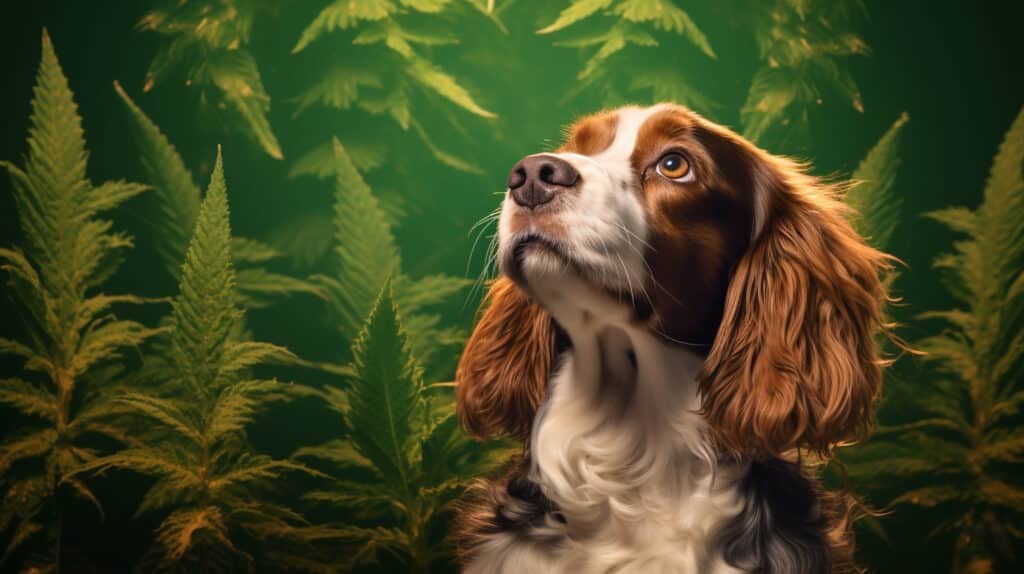Key Takeaways
- The method that your dog was exposed to cannabis matters for how they should be treated.
- Dogs have more cannabinoid receptors which means they’re more susceptible to the toxic effects.
- There is no official safe level of exposure to cannabis in dogs due to individual susceptibility.
- Cannabis intoxication is rarely fatal.
Weed, the colloquial term for marijuana, is the dried parts of the Cannabis plant which has long been used in herbal medicine and textiles. In modern times, weed is typically used for medicinal or recreational purposes. With more and more states in the US legalizing the use of Cannabis, we see more cases of accidental intoxication with the plant in our canine companions.
Cannabis can either be smoked, inhaled in vaporizers, or eaten in food and drink. The most common route of exposure in our pooches is ingestion of “edibles” such as brownies, chocolate bars, and gummies.
Containing over 100 chemicals called cannabinoids, some of these have psychoactive properties. One of the most commonly known is tetrahydrocannabinol (THC) which is psychoactive and potent.
Importantly, our canine companions have more cannabinoid receptors in their brains, meaning that the cannabis effects are more potent and dramatic than those seen in humans.
Cannabinoids in weed are also stored in your dog’s bile which is secreted back into the intestines when your dog eats their next meal after eating weed. This repeats the exposure of your dog to these psychoactive substances, thus prolonging the intoxication.
How much weed is toxic to dogs?
Cannabis is often considered to be safe for most people, but not everyone, and the same is true for our canine counterparts. Not all dogs follow a single intoxication pattern, with a small amount possibly affecting one dog more severely than another. With this in mind, there’s no officially recognized safe level for your dog to be exposed. Multiple factors play a role in how a dog is affected, these include age, health conditions, and body weight.
Weed intoxication is rarely fatal but can occur more commonly with medical-grade THC-containing products. It’s particularly important to prevent your pet from gaining access to medical-grade marijuana products for this reason.
What would happen if my dog ate weed?
Most of the signs that your dog has eaten weed will be neurological in nature. Your pooch may be uncoordinated (ataxic) and may be disoriented or sleepy. Alternatively, some dogs become hyperactive and vocal with dilated pupils.
Intoxicated dogs may drool or even feel nauseated to the point of vomiting. Vomiting isn’t very common, though, as cannabis has an antiemetic effect, thus inhibiting vomiting in many dogs. Urine leakage is also a common clinical sign that a dog has been intoxicated with cannabis. Dilated pupils are a tell-tale sign of drug intoxication, and dog can have a “wild-eyed” appearance with this.
Changes in heart rate, rhythm, blood pressure, and even slowed breathing rates are all commonly seen with weed ingestion, alongside changes in body temperature. These tend to be transient but can be dangerous, and your dog will feel quite rough.
Severe intoxication with weed can lead to your pet having tremors, seizures or even a coma and death.
When Should I Take My Dog To the Vet?
If you suspect or know that your dog has eaten weed, then you should take them to the veterinarian immediately, even if they seem fine.
The earlier your dog can be diagnosed and treated then, the more favorable the outcome is likely to be. This is especially true if the product was one that contains medical-grade marijuana.
What if my dog ate plenty of weed but seems fine?
Dogs will seem completely normal for quite a while after ingesting weed. This is because signs of toxicity can only manifest once the drug has been absorbed and thus is already in the dog’s system.
Once the drug is in your dog’s system and they start showing signs of toxicity, some of the treatment options, such as inducing vomiting to remove some of the drug, are no longer available to your veterinarian and, thus, to your dog.
It’s important to minimize your dog’s exposure to psychoactive substances, such as THC, in weed after it has been ingested.
This means inducing emesis, which should be done as soon as ingestion has been discovered.
Again, this is particularly important if your dog may have had access to medical-grade marijuana products, as these can pose a greater risk of severe effects or even death in comparison to weed used for recreational use.
Signs that my dog ate weed
Common signs that your dog ate weed include:
- Drooling
- Dilated pupils
- Incoordination/wobbly movements
- Uncharacteristically hyperactive
- Disoriented/“spaced out”
- Lethargic
- Uncharacteristically vocal
- Urinary incontinence
- Changes in heart rate and rhythm
- Slowed breathing rate
- Changes in body temperature
- Easily startled
- Seem wary of people they normally trust
- Tremors
- Seizures
- Collapse
- Coma
How do veterinarians treat dogs that have eaten weed?
The first goal of treating your dog after eating weed is to get the drug out of your dog’s system if possible.
This generally means inducing vomiting. This can be done if your dog isn’t showing any clinical signs yet or has only recently eaten the weed product (likely within 1-2 hours).
Your veterinarian can only induce vomiting when your dog is fully aware and behaving normally due to the risk of aspiration of vomitus if they are lethargic or disorientated. Following this, your veterinarian will then administer activated charcoal to prevent further absorption of the toxin.
This will need to be given every 6-8 hours. Administration of an enema can sometimes be used to reduce further absorption of THC from your dog’s gastrointestinal tract.
Once your dog has started to show signs of weed or THC intoxication, then the treatment goal is to support your dog through the period of time it takes for the drug to wear off.
Your veterinarian will administer fluids to prevent dehydration and to support blood pressure and organ function. Your vet may also administer Intralipid therapy in severe cases to absorb the THC already in your dog’s bloodstream.
Medications may be needed to regulate your dog’s heart rate and rhythm, and breathing rate. Your veterinarian may need to warm or cool your dog if their temperature is affected by the drug.
Your dog may feel nauseated or vomit and may have no desire to eat or drink, so other medications may be needed to make them feel better. Agitated dogs will need anti-anxiety medicines to help them feel more relaxed and less stressed.
Confinement in a small, comfortable space is good for pets, alongside keeping the area quiet and in low lighting to minimize sensory overload and stimulation for intoxicated pets.
How Long Will It Take My Dog to Recover?
While the effects of weed in the average human will wear off over about 12 hours after intoxication, these effects are prolonged in our canine companions.
Weed intoxication can last for 18-24 hours in pooches. Full recovery can take up to 72 hours in some dogs and is largely dependent on the dose ingested.
The prognosis is good for dogs that receive proper and prompt medical treatment, with most dogs not having any long-term ill effects of their weed intoxication.
Final Woof
Weed intoxication is rarely fatal. However, if your dog ate a weed gummy or brownie, then you should check for the presence of xylitol or chocolate, as they can complicate matters with their own toxic effects on our canine companions.
Prevention is better than cure, though, and always store ALL weed products out of reach of your curious pooch’s snoot.
No matter how your dog has had access to marijuana, you should ALWAYS seek veterinary advice and prompt treatment to prevent serious ill effects of toxicosis or even death, though thankfully, this is rare.


